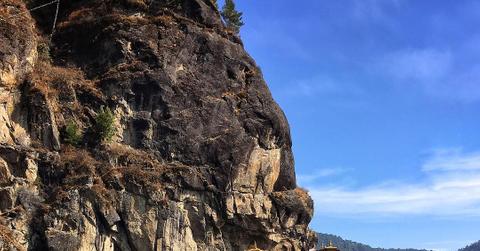Meet The World's First Carbon-Negative Country
As companies, researchers, scientists and entrepreneurs work to make industries and systems carbon-neutral, one tiny nation in the Eastern Himalayas has them all beat: Bhutan is world's first – and only – carbon-negative country.
Updated May 23 2019, 9:37 a.m. ET
As companies, researchers, scientists and entrepreneurs work to make industries and systems carbon-neutral, one tiny nation in the Eastern Himalayas has them all beat: Bhutan is world's first – and only – carbon-negative country.
Carbon-neutral is already pretty impressive, but carbon-negative – the process by which an entity removes more CO2 from the atmosphere than it is responsible for creating – is almost unheard of, especially for such a small nation. So how do they do it?
Turns out, it starts at the top. The nation's king, Jigme Singye Wangchuck, developed something called the Gross National Happiness, which was part of an effort to make the country one of the happiest in the world. While he succeeded at that, he simultaneously made it the greenest. That's because the index's four pillars include sustainable development, environmental protection, cultural preservation, and good governance, a recipe for a happy nation and a happy environment.
“Our enlightened monarchs have worked tirelessly to develop our country, balancing economic growth carefully with social development, environmental sustainability, and cultural preservation, all within the framework of good governance,” Tshering Tobgay, Bhutan’s Prime Minister said at a 2016 TED Talk.
Among some of the country's green policies is the law that 60 percent of its landmass must be maintained and protected as forest, which is in the constitution. It's currently 72 percent forested, and the country has even banned export logging. Bhutan also maintains this by offering only controlled, low-impact tourism, which includes changing all visitors sustainable development fees. Additionally, the country has won world records for planting the most trees per hour.
All these trees are what really make the country a carbon sink: while the country emits around 1.5 million tons of carbon annually, its forests absorb over 6 million tonnes, according to Proudly Carbon Neutral. But it is not stopping there. Bhutan is aiming for zero net greenhouse gas emissions and zero-waste by 2030 and 100 percent organic food production by 2020.
“The ratio of people to land mass—it's about the same size as Switzerland with just one tenth the population," Erin Levi, the author of the forthcoming Bradt Travel Guide to Bhutan, told National Geographic. "Its slow path to development—the first road was only built in the 1960s, which also means people were very slow to get cars."
When it does get more cars, however, they'll be electric. The Bhutanese government has formed a partnership with Nissan to provide hundreds of electric cars to the country, and thousands soon after. Tobgay wants to eventually convert all of the country's vehicles to electric, and the country would also like to increase its share of renewables while decreasing its reliance on hydropower and electricity imports in the winter. It's currently exploring wind, biogas, and solar.
